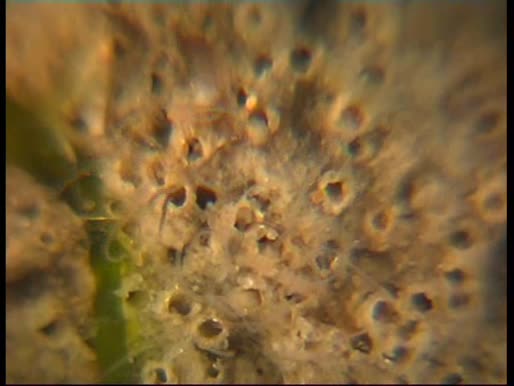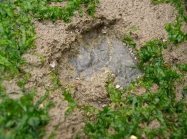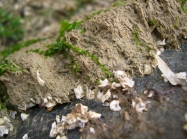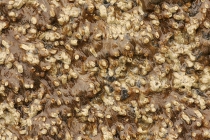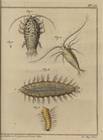
| Introduction | | Search taxa | | Taxon tree | | Taxon match | | Checklist | | Literature | | Stats | | Photogallery | | OBIS Vocab | | Log in |
CaRMS taxon detailsPolydora ciliata (Johnston, 1838)
131141 (urn:lsid:marinespecies.org:taxname:131141)
accepted
Species
marine,
recent only
(of ) Johnston, George. (1838). Miscellanea Zoologica. III. — The British Ariciadae. <em>Magazine of Zoology and Botany, Edinburgh.</em> 2: 63-73, plates II-III., available online at https://biodiversitylibrary.org/page/40025966
page(s): 66-68, plate III figs. 1-6 [details]
Distribution The widespread distribution claimed for Polydora ciliata of Australia, Indo-China, india, Red Sea, South Africa, Atlantic...
Distribution The widespread distribution claimed for Polydora ciliata of Australia, Indo-China, india, Red Sea, South Africa, Atlantic Ocean, Gulf of Mexico, Mediterranean Sea and Falkland Islands.(Fauvel,1953), is incorrect. Polydora ciliata is only known with certainty from the type locality. [details] Distribution Bay of Fundy to Cape Hatteras
Distribution Bay of Fundy to Cape Hatteras [details]
Read, G.; Fauchald, K. (Ed.) (2021). World Polychaeta database. Polydora ciliata (Johnston, 1838). Accessed through: Kennedy, M.K., L. Van Guelpen, G. Pohle, L. Bajona (Eds.) (2021) Canadian Register of Marine Species at: http://www.marinespecies.org/carms./aphia.php?p=taxdetails&id=131141 on 2024-04-26
Nozères, C., Kennedy, M.K. (Eds.) (2024). Canadian Register of Marine Species. Polydora ciliata (Johnston, 1838). Accessed at: https://marinespecies.org/carms/aphia.php?p=taxdetails&id=131141 on 2024-04-26
Date action by
original description
(of ) Johnston, George. (1838). Miscellanea Zoologica. III. — The British Ariciadae. <em>Magazine of Zoology and Botany, Edinburgh.</em> 2: 63-73, plates II-III., available online at https://biodiversitylibrary.org/page/40025966
page(s): 66-68, plate III figs. 1-6 [details] context source (Introduced species) Molnar, J.L., R.L. Gamboa, C. Revenga & M.D. Spalding. (2008). Assessing the global threat of invasive species to marine biodiversity. <em>Frontiers in Ecology and the Environment.</em> 6(9): 485-492., available online at https://www.conservationgateway.org/ConservationPractices/Marine/Pages/marineinvasives.aspx [details] Available for editors context source (Schelde) Maris, T.; Beauchard, O.; Van Damme, S.; Van den Bergh, E.; Wijnhoven, S.; Meire, P. (2013). Referentiematrices en Ecotoopoppervlaktes Annex bij de Evaluatiemethodiek Schelde-estuarium Studie naar “Ecotoopoppervlaktes en intactness index”. <em>Monitor Taskforce Publication Series, 2013-01. NIOZ: Yerseke.</em> 35 pp. (look up in IMIS) [details] additional source Integrated Taxonomic Information System (ITIS). , available online at http://www.itis.gov [details] additional source Hartmann-Schröder, G. (1996). Annelida, Borstenwürmer, Polychaeta [Annelida, bristleworms, Polychaeta]. <em>2nd revised ed. The fauna of Germany and adjacent seas with their characteristics and ecology, 58. Gustav Fischer: Jena, Germany. ISBN 3-437-35038-2.</em> 648 pp. (look up in IMIS) [details] Available for editors additional source Bellan, G. (2001). Polychaeta, <i>in</i>: Costello, M.J. <i>et al.</i> (Ed.) (2001). European register of marine species: a check-list of the marine species in Europe and a bibliography of guides to their identification. <em>Collection Patrimoines Naturels.</em> 50: 214-231. (look up in IMIS) [details] additional source Bromley, J.E.C. & J.S. Bleakney. (1985). Keys to the fauna and flora of Minas Basin. <em>National Research Council of Canada Report, Halifax, N.S.</em> 24119: 366 PP. [details] additional source Brunel, P., L. Bosse & G. Lamarche. (1998). Catalogue of the marine invertebrates of the estuary and Gulf of St. Lawrence. <em>Canadian Special Publication of Fisheries and Aquatic Sciences, 126.</em> 405 pp. (look up in IMIS) [details] Available for editors additional source Gosner, K. L. (1971). Guide to identification of marine and estuarine invertebrates: Cape Hatteras to the Bay of Fundy. <em>John Wiley & Sons, Inc., London.</em> 693 pp. [pdf copepod and branchiuran :445-455]. (look up in IMIS) [details] Available for editors additional source Day, J. H. (1967). [Sedentaria] A monograph on the Polychaeta of Southern Africa. Part 2. Sedentaria. British Museum (Natural History), London. pp. 459–842., available online at http://www.biodiversitylibrary.org/bibliography/8596 [details] additional source Muller, Y. (2004). Faune et flore du littoral du Nord, du Pas-de-Calais et de la Belgique: inventaire. [Coastal fauna and flora of the Nord, Pas-de-Calais and Belgium: inventory]. <em>Commission Régionale de Biologie Région Nord Pas-de-Calais: France.</em> 307 pp., available online at http://www.vliz.be/imisdocs/publications/145561.pdf [details] additional source Fauvel, P. (1927). Polychètes sédentaires. Addenda aux errantes, Arachiannélides, Myzostomaires. <em>Faune de France Volume 16. Paul Lechevalier. Paris.</em> 1-494., available online at http://www.faunedefrance.org/bibliotheque/docs/P.FAUVEL(FdeFr16)Polychetes-sendentaires.pdf [details] additional source Hartman, Olga. (1959). Catalogue of the Polychaetous Annelids of the World. Parts 1 and 2. <em>Allan Hancock Foundation Occasional Paper.</em> 23: 1-628. [details] Available for editors additional source McIntosh, William Carmichel. (1915). Polychaeta, Opheliidae to Ammocharidae. <em>A Monograph of the British Marine Annelids.</em> The Ray Society, London, 3 (1): i-viii, 1-368 (text)., available online at https://biodiversitylibrary.org/page/38532650 [details] additional source Mesnil, F. (1896). Études de morphologie externe chez les Annélides. I. Les Spionidiens des côtes de la Manche. <em>Bulletin Scientifique de la France et de la Belgique.</em> 29: 110-287, plates VII-XV., available online at https://biodiversitylibrary.org/page/10726590 [details] additional source Wilson, R.S.; Hutchings, P.A. and Glasby, C.J. (eds) 2003. List of Polychaete species introduced to Australia. Polychaetes: An Interactive Identification Guide. CSIRO Publishing, Melbourne [details] additional source Kendall, Michael A. (1980). Variations in some morphological characteristics of Polydora ciliata (Johnston). <em>Journal of Natural History.</em> 14(3): 405-411., available online at https://doi.org/10.1080/00222938000770351 [details] additional source Wilson, Douglas P. (1928). The larvae of Polydora ciliata Johnston and Polydora hoplura Claparede. <em>Journal of the Marine Biological Association of the United Kingdom.</em> 15(2): 567-603., available online at https://doi.org/10.1017/S0025315400009553 note: The P. ciliata came from oyster shell borings and thus may not have been P. ciliata [details] Available for editors additional source Radashevsky, V.I.; Pankova, V.V. (2006). The morphology of two sibling sympatric <i>Polydora</i> species (Polychaeta: Spionidae) from the Sea of Japan. <em>Journal of the Marine Biological Association of the United Kingdom.</em> 86(2): 245-252., available online at https://doi.org/10.1017/s0025315406013099 [details] additional source Liu, J.Y. [Ruiyu] (ed.). (2008). Checklist of marine biota of China seas. <em>China Science Press.</em> 1267 pp. (look up in IMIS) [details] Available for editors additional source Trott, T. J. (2004). Cobscook Bay inventory: a historical checklist of marine invertebrates spanning 162 years. <em>Northeastern Naturalist.</em> 11, 261-324., available online at http://www.gulfofmaine.org/kb/files/9793/TROTT-Cobscook%20List.pdf [details] Available for editors additional source Mustaquim, Javed. (1986). Morphological variation in Polydora ciliata complex (Polychaeta: Annelida). <em>Zoological Journal of the Linnean Society.</em> 86(1): 75-88., available online at https://doi.org/10.1111/j.1096-3642.1986.tb01808.x [details]  Present Present  Inaccurate Inaccurate  Introduced: alien Introduced: alien  Containing type locality Containing type locality
From editor or global species database
Distribution The widespread distribution claimed for Polydora ciliata of Australia, Indo-China, india, Red Sea, South Africa, Atlantic Ocean, Gulf of Mexico, Mediterranean Sea and Falkland Islands.(Fauvel,1953), is incorrect. Polydora ciliata is only known with certainty from the type locality. [details]Identification Polydora ciliata was frequently the name used during the early years of misidentification of Polydora-group species, before it was realized that there were in reality numerous species in the group. Note that Polydora ciliata is not a shell-borer. A recent rejection of identification as P. ciliata is in Rodewald et al (2021: 274) where they comment that: "Polydora cf. ciliata in Simon (2011) was identified according to Day (1967) who reported the species as boring into calcareous rock and 'lithothamnion' in southern Mozambique. The confusion between P. ciliata and P. websteri is not new and Blake & Kudenov (1978) even suggested that (all) early reports of P. ciliata as a shell-borer were likely of P. websteri. Furthermore, the name P. ciliata has erroneously been applied to multiple morphologically similar boring and non-boring species (Mustaquim 1988; Simon & Sato-Okoshi 2015), so the presence of P. ciliata in southern Africa is doubtful." [details] Synonymy The planktonic larva, Metadasydytes quadrimaculatus Roszczak, 1971, a genus and species from Vistula Lagoon, Baltic coast of Poland, and described as a gastrotrich, is clearly a spionid larva. Hummon (2008: 115) refers it to Polydora ciliata, but notes the identification to that species is not certain. [details] From other sources
Distribution Bay of Fundy to Cape Hatteras [details]
BIOTIC
Marine Life Information Network - UK To Biodiversity Heritage Library (132 publications) To European Nucleotide Archive (ENA) To GenBank (2 nucleotides; 0 proteins) To Global Biotic Interactions (GloBI) To PESI To USNM Invertebrate Zoology Annelida Collection (20 records) To Yale Peabody Museum of Natural History (YPM IZ 081279) To ITIS |
